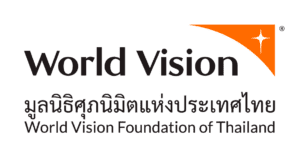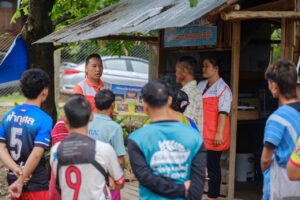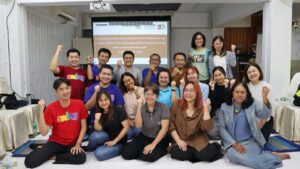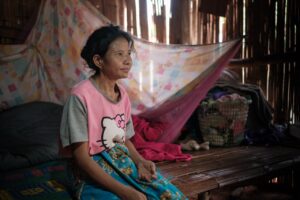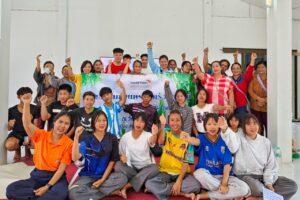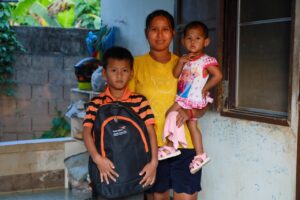“Migrant workers, especially women, are still afraid that because they are migrant workers, they may be discriminated against, making it difficult for them to access or obtain their rights. But as migrant workers like them, we go to the doctor, go to the hospital, give birth, and the necessary documents as migrant workers are correct and complete. Our children also have birth documents, grow up, and go to school. We will help inspire courage among women and migrant workers to see that everyone can be a migrant worker who has a living and receives justice according to their labor rights.” Lamaw, a female migrant worker from Myanmar
Living in a construction worker camp with her husband and children, Lamaw describes herself as a lucky migrant worker. Since her first steps in Thailand, she has worked with an employer who cares about the rights of her workers and has carried out all the paperwork as a migrant worker. This was the first door that allowed Lamaw to access the welfare that is entitled to as a migrant worker.
“When I got pregnant, I went to get prenatal care and delivery services, and we had the children’s birth documents properly prepared. The health officials also gave me information on how to care for newborns. They are healthy twin girls. Both are now in school.”
But at the same time, Lamaow is well aware that not all migrant workers have access to basic rights, especially female migrant workers. Many do not have the courage to seek services according to their labor rights. Many have experienced discrimination that has led to fear.
“What we want to do most is to use ourselves as an example for our friends to see that if we have legal documents to work, we have rights according to labor laws and we can really access those rights. We build courage, share knowledge, and make migrant workers understand, so that they can really do it. We have to tell them what we know. We have to explain to those who can’t speak Thai or understand. We also give advice to new people. For example, if they ask us, if they have given birth, what they have to do, what they have to do. We help answer them, including social security for workers, wages, and holidays. We have social security. If we don’t have a job, where do we go to report something? We talk to our friends so that they understand, so that they will receive the rights that they should have.”
It takes the collaboration of all stakeholders to promote migrant workers to access equitable worker rights, –men and women alike- as well as to support migrant children to access the rights they are entitled to. Employers, the private sector, the government and, most importantly, migrant workers themselves play important roles in empowering the migrant population to grow confidence to advocate for the rights they are entitled to, with correct knowledge and understanding
“They see what we can do. They gain knowledge. They understand the rights they have. They remove the stereotype of discrimination and change it to believe that they have rights and can access them. Because no matter who we are, we all have the basic right to have a good life as appropriate.”
———
Lamaw is one of the female migrant workers who participated in the project on access to female migrant workers and their families in construction worker shelters, operated by the Subhasinimit Foundation of Thailand in collaboration with Sansiri Public Company Limited, supported by the International Labour Organization (ILO) through the ‘Safe and Fair Programme’.
